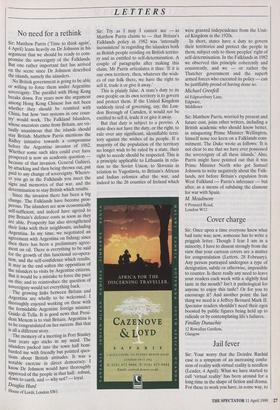Sir: Try as I may I cannot see — as
Matthew Parris claims to — that Britain's Falldands policy in 1982 was 'internally inconsistent' in regarding the islanders both as British people residing on British territo- ry and as entitled to self-determination. A couple of paragraphs after making this claim, Mr Parris articulates it thus: 'If it is our own territory, then, whatever the wish- es of our folk there, we have the right to sell it, trade it or give it away.'
This is plainly false. A state's duty to its own people on its own territory is to govern and protect them. If the United Kingdom suddenly tired of governing, say, the Lon- don Borough of Camden, it would not be entitled to sell it, trade it or give it away.
But that duty is subject to a proviso. A state does not have the duty, or the right, to rule over any significant, identifiable terri- tory against the wishes of its people. If a majority of the population of the territory no longer wish to be ruled by a state, their right to secede should be respected. This is a principle applicable to Lithuania in rela- tion to the Soviet Union, to Slovenia in relation to Yugoslavia, to Britain's African and Indian colonies after the war, and indeed to the 26 counties of Ireland which were granted independence from the Unit- ed Kingdom in the 1920s.
In short, states have a duty to govern their territories and protect the people in them, subject only to those peoples' right of self-determination. In the Falklands in 1982 we observed this principle coherently and consistently, and we — or rather the Thatcher government and the superb armed forces who executed its policy — can be justifiably proud of having done so. Michael Grenfell
64 Edgwarebuly Lane, Edgware, Middlesex


































































 Previous page
Previous page